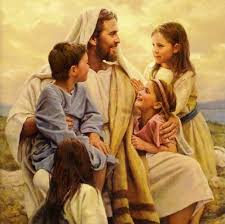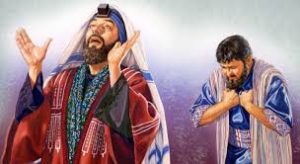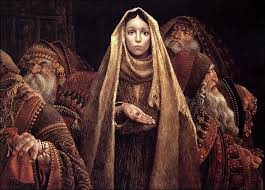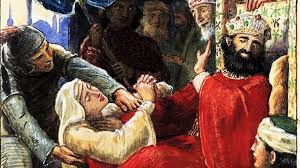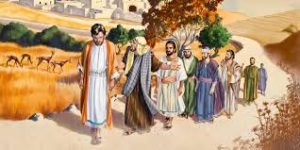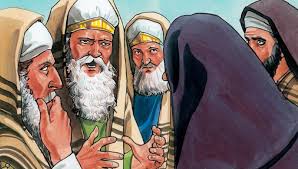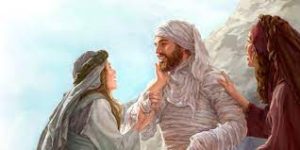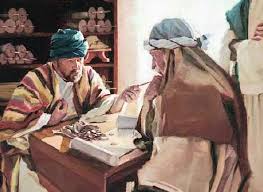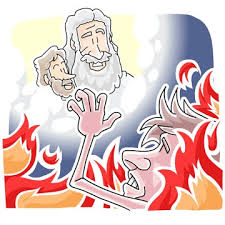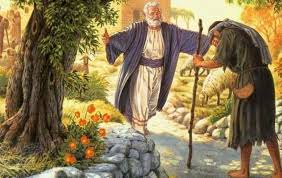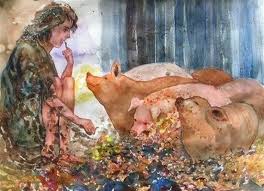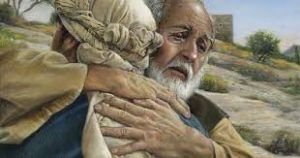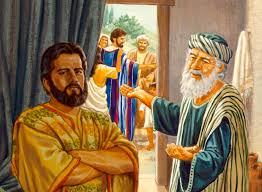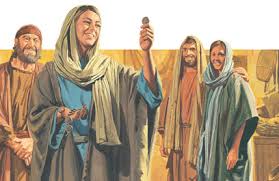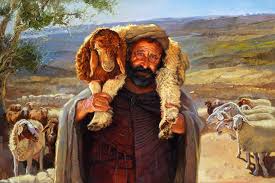Il – The Rich Young Ruler Matthew 19:16 to 20:16; Mark 10:17-31; Luke 18:18-30
The Rich Young Ruler
Matthew 19:16 to 20:16; Mark 10:17-31; Luke 18:18-30
The rich young ruler DIG: What seems to have been the rich young ruler’s view on how one obtains eternal life? Different facets of God’s goodness are revealed in Psalm 139. What do you learn about His goodness to you in verses 1-5, 7-12? What was the heart of the issue? Is the problem riches or the love of riches that prevents some from entering the Kingdom? Since wealth was commonly considered a sure sign of God’s blessing, what was the problem for the talmidim? Why didn’t the young yeshiva end up following Christ?
REFLECT: How do you fill the spiritual void in your life? Works? Faith? Keeping kosher? Mysticism? Belief in some ambiguous “higher power?” Is the difference between needing money and the love of money for you? What have you given up to follow Jesus? How is your life different as a result? What has helped you to see the impossibility of “earning” the right to go to heaven? What kind of workers are we in God’s vineyard?
In the parable of the two debtors (to see link click Ef – Jesus Anointed by a Woman Who Led a Sinful Life) we studied the same question set forth here. In each passage there is first a discussion about the Torah, then followed with a teaching with a parable as the climax in the center. Yet, at the same time, the passages are structured differently. The parable of the two debtors has two rounds of debate with two questions and two answers in each round. The parable of the camel’s eye, however, has five inverted topics with the parable as the climax in the center. This dialogue has an A-B-C-D-E-D-C-B-A structure.
As Jesus started on His way from the house where He blessed the children, a certain ruler, probably a young rabbinical student from a local synagogue in Southern Perea urgently ran up to the Lord and respectfully fell on his knees before Him. He belonged to the same class of Pharisees that young Saul of Tarsus did. This passage begins with the topic of eternal life (see Ms – The Eternal Security of the Believer) and comes full circle back to the same topic at the end. But there is a difference. In the opening stanza the rich young ruler wants to do something to inherit eternal life. At the end of the teaching, however, we see that eternal life is received as a gift, not an earned right.1202
After the encounter with the young man on the requirements of eternal life, there evidently remained some lingering questions on the part of the apostles. They needed some clarification on the fairness of the coming judgment in messiah’s Kingdom. Therefore, Yeshua teaches them the parable of the workers in the vineyard. But we start our lesson with Messiah’s interaction with a rich young yeshiva that had a very important question.

(A) Inherit eternal life: “Good Rabbi,” he asked Christ, “what must I do to inherit eternal life” (Matthew 19:16; Mark 10:17; Luke 18:18 CJB)? He clearly wants to achieve eternal life by his own efforts. Jews believed that to inherit eternal life and to enter the Kingdom were synonymous ideas. The young rabbinical student knew that Yeshua was offering Himself as a King and was offering the Kingdom to Isra’el. He also must have known from the Scriptures that righteousness was necessary to enter the Kingdom. He wanted to know what kind of righteousness ha-Meshiach required to enter His Kingdom, and if the righteousness he possessed was sufficient to admit him.
Jesus did not immediately answer his question; rather, like all good rabbis, the Lord answered his question, with a question: Why are you asking Me about what is good? Messiah answered. No one is good – except God alone (Matthew 19:17a; Mark 10:18; Luke 18:19 NASB). There are those who take Yeshua’s words to mean, “You should not be calling me good because only God is good, and I am not God. But it doesn’t say that; rather, it challenged the young man to consider who the Son of Righteousness really was, whether He was more than an ordinary human being.1203 The Greek construction emphasizes the word good. But here the word is agathos, which means the absolute intrinsic goodness of God, which is characteristic of His true nature.
So this young yeshiva missed the point. He should have answered, “I call you intrinsically good because You are God.” If the young man had answered in that way, he would have answered his own question. Jesus wanted the young man to think carefully about what and who is good, because there were competing types of goodness to choose from, that of the Pharisees, and that exhibited from His own teaching. Now the Lord just claimed to be intrinsically good, but does the young rabbinical student agree or disagree? The way to inherit eternal life is accepting Jesus as the Messiah. But he remained silent. His silence indicated that he had spoken the word inadvertently, not because he really believed that Yeshua was the Son of God. Therefore, Christ could not declare him righteous.
(B) New requirements explained to the young ruler: Our Savior did not criticize him, but, confirming His Torah observance, the Lord pointed him to the Ten Words (see the commentary on Deuteronomy Bk – The Ten Words): If you want to enter eternal life, keep the commandments. Which of the six hundred and thirteen should I obey? the young man inquired. Confirming that He was Torah observant, Yeshua replied: You know the commandments: You shall not murder, you shall not commit adultery, you shall not steal, you shall not give false testimony, honor your father and mother, you shall not defraud, and “love your neighbor as yourself” (Matthew 19:17b-19; Mark 10:19; Luke 18:20). It is of note to notice that Yeshua ben David only quotes human relationships (commandments 5 through 10). But because he did not specifically mention the commandments relating mankind’s relationship to God (commandments 1-4), the young ruler was relieved by the Lord’s answer. If eternal life could be obtained by merely keeping good human relationships, then it was already his . . . the deeper meaning of the commandments were still hidden from him.
“Rabbi,” the young yeshiva declared, “all these human relationships I have kept well since I was a boy” (Matthew 19:20a; Mark 10:20; Luke 18:21). This probably referred to the age of thirteen, when every Jewish boy became a bar mitzvah, or son of the covenant. At that point he became responsible to live by the commands of ADONAI. It was not as if the young man was saying, “I’m perfect Jesus.” He had observed those commandments. Not perfectly, but he had been as faithful as a sinful, fallen human being could be. He was about as kosher as you could get! Today we would call him Torah observant. But even the most religious, sincere rabbi recognized that there was still a spiritual void in his life, so he asked: “What do I still lack (Matthew 19:20b)?
(C) The demands of the new obedience: When Jesus heard this, He looked at him and loved (Greek: agapao) him (Mark 10:21a). This is the love of John 3:16 . . . For God so loved the world that He gave His one and only Son, that whoever believes in Him shall not perish but have eternal life. The love exhibited at the cross was called out of the heart of God because of the preciousness of each lost soul, precious to ADONAI because He sees in lost humanity His own image even though that image be marred by sin, precious to Ha’Shem because we are made of material which through redemption can be transformed into the very image of His dear Son. While it is a love based upon the estimation of the preciousness of the person loved, it is also a love of self-sacrifice, complete self-sacrifice to the point of death itself, and that for those who bitterly hate the One who loves.1204
Then our Lord made a dramatic request: If you want to be [complete] you still lack one thing. Then Jesus got to the heart of the spiritual issue for this particular rabbinical student, saying: Go, sell your possessions, everything you have and give to the poor, and you will have treasure in heaven. Then come, follow Me (Matthew 19:21; Mark 10:21b; Luke 18:22). To obey Messiah’s instructions would not have given this young man eternal life. It can only be obtained through faith/trust/belief in Jesus Christ and His sacrificial death on the cross (see First Corinthians 15:3-4). But, the obedience of selling all his possessions would have been an important first step in removing the spiritual barrier separating the young man from the assurance of eternal life. The root of his problem was the love of money (First Timothy 6:10) and that had to be dealt with first before the young yeshiva could have any thoughts of eternal life. Now he had his answer, however, it probably wasn’t the one he wanted to hear.
(D) The demands of the new obedience are seen as too hard by the apostles: When the young rabbinical student heard this, his face fell and he became very sad (I am sure it saddened Jesus as well). His hopes were dashed and his response was telling. He went away sad (but not sad enough to change) because he had great wealth (Matthew 19:22; Mark 10:22; Luke 18:23). To obey Jesus was too great a risk for him to take. The rabbis taught that being wealthy was a sign that God was blessing you. If they were wealthy they believed they already had eternal life! This belief made it even more difficult for them to see their desperate spiritual need for Christ. So the security of wealth kept him out of the Kingdom.1205 His problem was not money, but he had gotten to the point in his life where he trusted in money rather than trusting in God. This is not a general requirement for discipleship, but was specific to his belief system. His riches were like the seed that fell among the thorns, which grew up with it and choked the Word out of his life (see Et – The Parable of the Soils). So the general application is this: Do not love anything or anyone more than ADONAI. Yeshua calls us to do away with anything that is more important to us than Him. Obedience leads to life and brings joy; disobedience leads to death and sorrow.
Then, after he had left, Jesus looked around the circle of His talmidim and taught them a lesson. He said to them: Children (for they were still being tutored in the faith), I tell you how truly hard it is for someone who is rich to enter the kingdom of God (Matthew 19:23; Mark 10:23-24; Luke 18:24)! He doesn’t say it is impossible for the wealthy person to be saved, but someone who loves riches more than Him to be saved. How the words of James echo in our hearts: Listen, my dear brothers and sisters: Has not God chosen those who are poor in the eyes of the world to be rich in faith and to inherit the Kingdom He promised those who love Him (James 2:5).
(E) The parable of the camel and the needle. Again I tell you, it is easier for a camel to go through the eye of a needle than for someone who is rich to enter the kingdom of God (Matthew 19:24; Mark 10:25; Luke 18:25). Matthew and Mark speak of a needle that is used with thread, and Luke uses the medical term for the needle used in surgical operations. Luke does this type of thing numerous times and is the reason why many people suppose he was a doctor. Yes, there are places in Jerusalem where the Jews built small entrances so an enemy could not merely ride in on their camels. But Jesus is using humor here. The Talmud twice speaks of an elephant passing through the eye of a needle as being impossible (Tractate Berakhot 55:2). That being the case, this statement by Yeshua is best seen as a striking rabbinic-like hyperbole to capture the attention of the students.The one main point of the parable of the camel and the needle is that it is impossible for anyone whose love for wealth keeps him or her from trusting in Messiah as Savior, to be saved.
There is a shift at the center of the teaching that can be seen in the move from the singular to the plural. The first half is addressed to a particular person, the rich young ruler, and all the verbs are in the singular. In the center the parable of the camel and the needle makes a generalized application, but from now on the text deals with plurals and collectives. This specific observation is crucial for an understanding of the whole teaching, including the parable of the workers in the vineyard. Therefore, the discussion with the rich young ruler sets the stage for an analysis of the same question for all of us.
(D) The new demands are only possible with God: When the talmidim heard the word-picture they were even more amazed. Such teaching seemed inconceivable to the Twelve who had been brought up on the rabbinical teaching that riches were a sure sign of divine pleasure and an evidence of God’s blessing. So in unison they broke out into a cry of despair, exclaiming: Who then can be saved (Matthew 19:25; Mark 10:26; Luke 18:26)? The way the apostles heard Christ, they didn’t think it was difficult – they thought it was impossible! But what Jesus was actually saying, was that it was as hard for some who loved their wealth more than Him to get into heaven as a camel going through the eye of a physician’s needle. In other words, He was showing them that it was utterly impossible for one who trusts in money to enter the Kingdom.
Jesus looked at them and reminded them that there is always hope, for with mankind this is impossible, but not with God; with God all things are possible (Matthew 19:26; Mark 10:27; Luke 18:27). The word with in the Greek literally means beside. Take your stand beside the world in the question of riches and it is impossible to be saved. But take your stand beside God on the matter, and what used to be impossible becomes possible.1206
(C) The demands of the new obedience are fulfilled by the apostles: Granted, it is very difficult for a person who values their wealth more than God to change their lifelong priorities, but God is bigger than their struggles. All this begged the question for those committed apostles of Christ. Peter was quick to point out that he and the others had done what Messiah demanded of the young yeshiva. Speaking for all twelve of them, he asked Him, “We have left everything to follow You! What then will there be for us” (Matthew 19:27; Mark 10:28; Luke 18:28)? Peter and John left a lucrative fishing business, and Matthew, a rich source of income from his tax collector’s office, to become the talmidim of a poor itinerant preacher. It was as if Peter was saying, “ What reward will we get for having become poor for your sake?” What follows is a beautiful promise from Jesus to the Twelve.
Yeshua said to them: Truly I tell you, at the renewal of all things, when the Son of Man (see Co – Jesus Forgives and Heals a Paralyzed Man) sits on his glorious throne, you who have followed Me will also sit on twelve thrones, judging the twelve tribes of Isra’el (Matthew 19:28). With the tremendous faith commitment of the original twelve will come a tremendous blessing as a reward. The number twelve is not coincidental. As the twelve sons of Jacob were blessed to head the tribes of ancient Isra’el, so would the twelve messianic leaders lead the spiritual renewal of Isra’el. Indeed, the talmidim had made a commitment far beyond all others in their day, and, in fact, all subsequent disciples down to today. They were the first ones to leave all their personal relationships and worldly possessions to follow a brand new Jesus movement.1207
(B) New requirements fulfilled by all believers: No one who has left home or brothers or sisters or mother or father or [husband or wife], or parents or children or fields for Me and the Gospel will fail to receive a hundred times as much in this present age: homes, brothers, sisters, [husbands, wives], mothers, children and fields – along with persecutions – for the sake of the kingdom of God (Matthew 19:29a; Mark 10:29; Luke 18:29). But not only will the twelve apostles be rewarded but anyone who has made the sacrifice for His sake will inherit eternal life and the Millennial Kingdom.
(A) Inherit eternal life: Those who follow Christ will receive many times as much in this age and in the age to come. They will inherit eternal life (Matthew 19:29b; Mark 10:30; Luke 18:30). Their reward may not necessarily be monetary or material. If nothing else, such disciples are promised the blessing of shalom as they invest their lives in the things of the kingdom of God. But the greatest blessing of all, which Yeshua guarantees here, is that of eternal life.
However, it is not only the rich young ruler or the twelve talmidim who should carefully consider this lesson. Present-day Jews and Gentiles likewise should consider the spiritual implications of what we value in this world. All believers will appear before Jesus and give an account for our lives and our decisions (see my commentary on Revelation Cc – For We Must All appear Before the Judgment Seat of Christ). And at that time many who are first will be last, and many who are last will be first in Christ’s coming Kingdom (Matthew 19:30; Mark 10:31).
The apostles were looking forward to the coming Kingdom with eager expectations, but they believed that when it came they would greatly profit in a material way. Peter’s question had revealed their mercenary spirit and Messiah immediately discerned it. Therefore, He used that teachable moment to tell His little band of students another parable.
Therefore, Jesus taught them the parable of the workers in the vineyard. This parable answered Peter’s question: We have left everything to follow You! What then will there be for us (Matthew 19:27; Mark 10:28; Luke 18:28)? Once again this parable is set in a chiastic structure with E as the climax: A-B-C-D-E-D-C-B-A.
At the end of The Pilgrim’s Progress, John Bunyan notes that there is an entrance to hell even from the gates of heaven. Judas is proof of that. The night he betrayed Jesus with a kiss, he stepped forever out of Christ’s presence and sealed his eternal doom. Who knows how many like him have come near enough to learn the truth and profess faith in Messiah, only to forfeit heaven completely because they refuse to surrender control of their lives? In a sense, their entrance to hell is from the gates of heaven.
But there is a contrasting reality as well and was pictured often in Yeshua’s earthly ministry. It is that even the lowest of sinners may be ushered into heaven from the very doorstep of hell. Tax collectors, prostitutes, thieves and beggars all found the Lord who gave them eternal life in exchange for the leftovers of their squandered earthly existence. For the Son of Man came to seek and to save to lost (Luke 19:10) and He loves to snatch others from the fire and save them (Jude 23a). No one, no matter how entangled in sin, is beyond the reach of His redemptive power.
Yeshua did what no one else could do for them. He cast out evil spirits from the demon-possessed. He touched and made whole the ravaged bodies of lepers. He gravitated to such people, and they in turn were drawn to Him for salvation. Consequently, He is totally able to deliver those who approach God through Him; since He is alive forever and thus forever able to intercede on their behalf (Hebrews 7:25 CJB). Every repentant sinner who surrenders in faith to Christ receives full salvation. This is the way salvation operates. All the redeemed receive the same eternal life, whether they are young or old, respectable or contemptible, Pharisees or tax collectors. No one who comes to the Savior of sinners receives preferential treatment or is slighted because of his or her background.1208
(A) The kingdom of Heaven is like: For the kingdom of Heaven is like a landowner who went out early in the morning to hire workers for his vineyard (Matthew 20:1). This situation was common in first-century Isra’el and would be useful in shedding some light on the reality of the Kingdom. Every summer, both old and new vines had to be pruned back to improve production. Vineyards were generally planted on stony terraced hillsides. Therefore, building the terraces, pruning the vines and preparing for the harvest was demanding work. Because most landowners did not have enough household servants or regular workers to do those jobs, temporary day workers were hired from nearby towns and villages. They would begin work at six in the morning and continue to work until six in the evening.
(B) Agreed to pay them the usual daily wage: As would be expected, the landowner found them in the marketplace and agreed to pay them a denarius for the day and sent them into his vineyard (Matthew 20:2). A denarius per day was a good wage – equal to a day’s pay for a soldier. It was likely they were normally paid less, so they readily agreed to the landowner’s equitable offer. No one had any reason to complain; all were paid, exactly what they had agreed to work for.
(C) I will pay you whatever is right: The workday began at six in the morning. Then about nine in the morning the landowner realized that he would not be able to finish the urgent tasks with these workers alone, so he went into town again and saw others standing in the marketplace because no one had hired them. He immediately hired them, not offering them a specific wage but simply said: You also go and work in my vineyard, and I will pay you whatever is right. So they went without a word of bargaining, trusting in the justice of the employer. The situation grew even more complex when he went out again about noon and about three in the afternoon and did the same thing (Matthew 20:3-5). Each time he found more men hoping to work and he generously hired them.
(D) Going out about five in the afternoon: Still needing more workers to finish the demanding work, the landowner went into town again about five in the afternoon (about one hour before sundown) and found still others standing around. This group evidently had been standing around all day long doing nothing. Perhaps they were in another section of the market or had somehow been overlooked. Or perhaps they were the oldest, weakest and least productive workers and no one wanted to hire them. But those particulars are really irrelevant to the parable. The point is that the landowner was touched and he said to them, “You also go and work in my vineyard even at this late hour” (Matthew 20:6-7).
(E) Beginning with the last and ending with the first: Finally, when evening came, it was time for the workers to receive their appropriate wages. Following the requirement in the Torah to pay such workers at the end of each day (Leviticus 19:13; Deuteronomy 24:14-15), the owner of the vineyard said to his foreman, “Call the workers and pay them their wages.” But his next command was quite unusual. The men were to be paid beginning with the last ones hired and going on to the first (Matthew 20:8). Here is where Jesus was able to demonstrate mankind’s self-serving ideas of fairness, and where the parable begins to intersect with the proverb the last will be first, and the first will be last (Matthew 20:16 and 19:30). The primary idea of the parable, and Yeshua’s application of the proverb is a simple reversal of the payment order. Although the procedure wasn’t customary, it shouldn’t have produced much concern. The radical action of the landowner, which reflects the parable’s main point is that those hired at the very last received the very same payment as those who had labored all day.1209
(D) Those who went out about five in the afternoon: The workers who were hired about five in the afternoon came and each received a denarius. So when those came who were hired first, they were elated! Because he had paid the other men a full day’s wage for one hour’s work, they expected to receive more than a full day’s wage. At that rate they would have received twelve day’s pay for one day’s work! They were more than willing to be paid last if it meant being paid so well. But much to their disappointment, each one of them also received a denarius (Matthew 20:9-10).
(C) They thought they should have received more: When they received it, they began to grumble against the landowner. Their complaint seemed legitimate at first. “These who were hired last worked only one hour,” they said, “and you have made them equal to us who have borne the burden of the work and the heat of the day” (Matthew 20:11-12). The workers who had worked the entire day felt they had been cheated. Their normal, very human reaction was, “That’s not fair! Those men only worked an hour at the end of the day. We worked hard all day long and during the heat of the day. Why should they get paid as much as we did?” They may have been overdramatizing their case, but their basic description of the situation was correct. The problem had nothing to do with how they were treated. The problem was that these workers could not accept the good fortune of the others. They were envious.
(B) Did you not agree on the usual daily wage: But when the landowner was questioned about the apparent injustice, he corrected their thinking and answered one of them, saying: I am not being unfair to you, friend. Didn’t you agree to work for a denarius? They should not be complaining if he chose to be generous, so he said: Take your pay and go. I want to give the one who was hired last the same as I gave you. He reminded them, “Don’t I have the right to do what I want with my own money? Or do you begrudge My generosity?” Literally, “Is your eye evil because I am good (Matthew 20:13-15 CJB)? The generosity of the landowner was not evil, but the jealousy of the workers was. They could not stand the thought that someone else could get equal pay without working as hard or as long as they did. And instead of rejoicing, they grumbled.
(A) The last will be first, and the first will be last: The closing sentence ties the parable to the larger context of Yeshua’s teaching. No one is ahead and no one is behind, so the last will be first, and the first will be last (Matthew 20:16 and19:30). Therefore, in the coming kingdom of the Meshiach everyone crosses the finish line at the same time. A place in the Kingdom is not something to be earned. ADONAI gives it without regard to how long you worked or how hot the day was.
Many workers (believers) have different spiritual gifts and serve for various periods of time as the Lord allows. Whether it is a short period of time, or a long period of time, it should make no difference if we are sincerely serving Yeshua. There are many blessings in this present age that long-time believers enjoy (Matthew 19:29). Yes, it is a wonderful blessing to be assured of eternal life. What isn’t brought to light in this analogy is the fact that the workers who were hired last missed out on so many potential blessings. If you have that perspective, the workers who were hired first had many extra benefits for which they could give thanks. The one main point of the parable of the workers in the vineyard is that no matter what our personal experience, God is completely fair in how He treats His children. Instead of grumbling, our energy would be better spent enjoying the journey as we serve our Messiah!1210
In 1915 Pastor William Barton started to publish a series articles. Using the archaic language of an ancient storyteller, he wrote his parables under the pen name of Safed the Sage. And for the next fifteen years he shared the wisdom of Safed and his enduring spouse Keturah. It was a genre he enjoyed. By the early 1920s, Safed was said to have a following of at least three million. Turning an ordinary event into an illustration of a spiritual truth was always a keynote of Barton’s ministry.
I rode upon a Railway Train; and we were in the Rocky Mountains. And we woke in the morning, and the Train was climbing, with two Engines pulling us, and one pushing behind. And we were nigh unto Twelve Furlongs above the Sea.
And it came to pass as we ascended, that there were clouds below us, and Clouds upon the sides of the Mountains, but there were no Clouds above us, but the clear shining of the Morning Sun.
And there came unto me a small Girl and her younger Brother, who were riding upon the Train, and we talked about the Clouds. For so did John Ruskin, and Aristophanes, and the little lad was very happy, and he said, I have never been above the Clouds before.
And his sister was Worldly-wise. And she said, A Cloud ain’t nothing but just fog.
And he said, Nay, but this is more. And behold now, how then is a Cloud just under us, and we ride upon the top of it?
And she said, We are on the Rails, just as we always have been; and there can’t nobody ride on a cloud.
And the boy said, Jesus can ride upon a Cloud; for I saw a Picture of Him.
And the little girl may have been right; but I thought within myself that this world hath too many people who look out on Life through her windows. For they see not sunlit Clouds, but only Fog; and they have little faith in rising above Clouds, and live in the sunlight of God. And I have know others who, whenever it is said unto them, Thus have others done, or this did the good Lord Jesus, make reply, Yes, but that ain’t us.
And if it is spoken concerning the House of God, Thus did the Church in Jonesville, and thus was it done by the Church in Smithville, they answer, Yes, but that ain’t us.
And if it be said, You should be a better person; for others have risen above the Clouds and their Infirmities, they say, Yes, but that ain’t us.
And when it is said, Thus hath the grace of God abounded in other lives, they say, Yes, but that ain’t us.
But if it ain’t, why ain’t it?
For this cause did God dwell in human flesh that we should never count any good thing impossible through the dear Lord Jesus.
For He is our peace, who hath broken down the middle partition, that we should no longer have to say, But that ain’t us.1211



